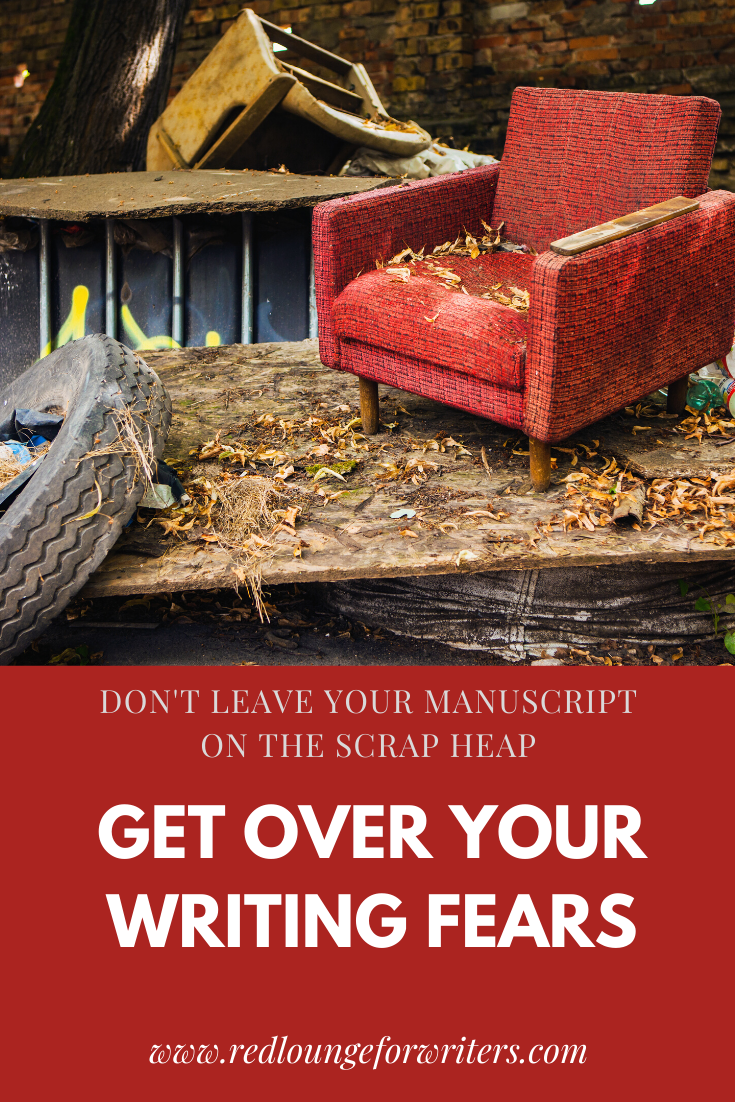Are you a writer who’s too afraid to keep going? Don’t leave your work on the scrap heap.
If you talk to any writer, at some point, you’ll discover fear.
It doesn’t matter if they’re a newbie, learning and starting out or they’ve published 20 books. Fear is always there, just below the surface. And it can stop anyone in their tracks. There are plenty of never-started or half-finished books hiding in drawers or on hard drives out there in the world.
There are also plenty of insecure writers finding all sorts of reasons as to why they aren’t writing.
“I don’t have time.”
“Life gets in the way.”
“I can’t decide what I’m going to write.”
I wonder: if you dug a little deeper into why a writer isn’t writing, would the real reason be fear?
What are writers afraid of? I’ve heard these comments before.
“No one will want to read what I’ve written.”
The world is a big place. There are a whole lot of people out there. Many of them can read (that’s what school is for) and many of them are looking for something exactly like what you’ve written.
If your story is unique, people will enjoy the fact that it’s different from other people’s stories. If it’s similar, there are people who love to read the same-but-slightly-different version of a story over and over.
There is more than likely an audience out there for you, whether it’s broad or niche, big or tiny.
“People will attack, belittle or criticise me for what I’ve written.”
First, there’s a difference between taking useful critique and feedback, and being attacked. All writers need to toughen up and put a bit of distance between ourselves as people and our stories, even though they feel like one and the same thing. (Spoiler: they aren’t.)
However, it is true that we live in a ‘cancel’ culture where sometimes the mob can pile on if they don’t like your opinion. Let’s be real: there are social media platforms that can be scary places. It’s easy to be rude on social media. If you’re truly scared of it, you’ll need to consider whether what you’re putting out is likely to be jumped on and decide if you’ll take the risk or not. Perhaps you could write something different at first. Perhaps you could stay off the platforms you’re nervous about.
“No one will ever publish this.”
You don’t know that. Honestly, you don’t. The world is full of amazing books that were rejected over and over but ended up being the first in their genre. Yours might be one of them. And these days, self-publishing is a great option too.
“My writing game isn’t strong; my skills are rubbish; I don’t know what I’m doing.”
A tiny percentage of people are born with the ability to throw words on a page, re-arrange them slightly and present the world with a masterpiece. Most writers have to learn their craft, however, just like cooks have to learn knife skills, plumbers have to learn to lay pipe and economists have to get higher degrees.
Like anything else in life, if you don’t have skills to do something you want to do, you go get the skills. Read a book, do a course, join a critique group. There’s a world out there dedicated to upskilling writers. You can find your information for free, or you can pay for it, but it’s out there. Don’t hide behind your current lack of skill – you can learn and grow.
And don’t think that those naturally talented, brilliant writers don’t get frightened like you; they’re bigger scaredy-cats than the rest of us.
I know two writers who are exceptional. They don’t just sketch a scene; they daub it so that the light is dappled, the shadows subtle. They can gather and group words in ways that make me melt with satisfaction.
I’ve said to both these writers, ‘This is so good it’s crazy.’ But neither writer is published. In fact, in the years I have known them, neither writer has finished their manuscript to their satisfaction. I can only put it down to fear of some kind. Maybe we just need to say this to ourselves: I’m good enough. My writing is good enough. It’s good enough. And then, whether we believe it or not, pretend and act as if we believe it, and keep writing.
I’ve read their work, and I get excited by it. But it makes me sad that it isn’t out there for the world to enjoy and learn from.
Don’t let fear stop you.
Breathe through it.
Get what you need.
Keep going.
If you’re terrified about writing your memoir, we can help you with both the writing skills and the planning and structure. Check out our comprehensive Write Your Memoir course.
Give us some Pinterest love.









